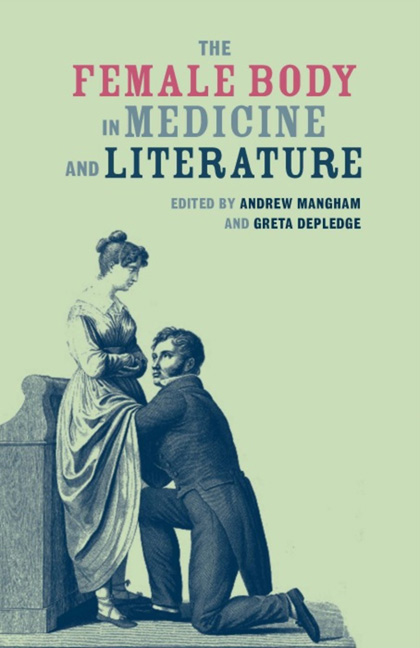Book contents
- Frontmatter
- Contents
- Acknowledgements
- Notes on Contributors
- 1 Introduction
- 2 ‘Difficulties, at present in no Degree clear'd up’: The Controversial Mother, 1600–1800
- 3 Monstrous Issues: The Uterus as Riddle in Early Modern Medical Texts
- 4 Surveilling the Secrets of the Female Body: The Contest for Reproductive Authority in the Popular Press of the Seventeenth Century
- 5 ‘Made in Imitation of Real Women and Children’: Obstetrical Machines in Eighteenth-Century Britain
- 6 Transcending the Sexed Body: Reason, Sympathy, and ‘Thinking Machines’ in the Debates over Male Midwifery
- 7 Emma Martin and the Manhandled Womb in Early Victorian England
- 8 Narrating the Victorian Vagina: Charlotte Brontë and the Masturbating Woman
- 9 ‘Those Parts Peculiar to Her Organization’: Some Observations on the History of Pelvimetry, a Nearly Forgotten Obstetric Sub-speciality
- 10 ‘She read on more eagerly, almost breathlessly’: Mary Elizabeth Braddon's Challenge to Medical Depictions of Female Masturbation in The Doctor's Wife
- 11 Mrs Robinson's ‘Day-book of Iniquity’: Reading Bodies of/and Evidence in the Context of the 1858 Medical Reform Act
- 12 Rebecca's Womb: Irony and Gynaecology in Rebecca
- 13 Representations of Illegal Abortionists in England, 1900–1967
- 14 Afterword: Reading History and/as Vision
- Index
3 - Monstrous Issues: The Uterus as Riddle in Early Modern Medical Texts
- Frontmatter
- Contents
- Acknowledgements
- Notes on Contributors
- 1 Introduction
- 2 ‘Difficulties, at present in no Degree clear'd up’: The Controversial Mother, 1600–1800
- 3 Monstrous Issues: The Uterus as Riddle in Early Modern Medical Texts
- 4 Surveilling the Secrets of the Female Body: The Contest for Reproductive Authority in the Popular Press of the Seventeenth Century
- 5 ‘Made in Imitation of Real Women and Children’: Obstetrical Machines in Eighteenth-Century Britain
- 6 Transcending the Sexed Body: Reason, Sympathy, and ‘Thinking Machines’ in the Debates over Male Midwifery
- 7 Emma Martin and the Manhandled Womb in Early Victorian England
- 8 Narrating the Victorian Vagina: Charlotte Brontë and the Masturbating Woman
- 9 ‘Those Parts Peculiar to Her Organization’: Some Observations on the History of Pelvimetry, a Nearly Forgotten Obstetric Sub-speciality
- 10 ‘She read on more eagerly, almost breathlessly’: Mary Elizabeth Braddon's Challenge to Medical Depictions of Female Masturbation in The Doctor's Wife
- 11 Mrs Robinson's ‘Day-book of Iniquity’: Reading Bodies of/and Evidence in the Context of the 1858 Medical Reform Act
- 12 Rebecca's Womb: Irony and Gynaecology in Rebecca
- 13 Representations of Illegal Abortionists in England, 1900–1967
- 14 Afterword: Reading History and/as Vision
- Index
Summary
The female reproductive system has, from very early on, been cast as the riddle of all riddles, as an entity calling for confounding and astounding descriptions that only the riddle is uniquely constructed to convey. To bear and to be born, these strike one as originary elemental riddles somehow in defiance of Aristotle's dictum that nothing can come from nothing. One of the earliest and possibly best-known recorded riddles about the mysterious uterus appeared for centuries in a Latin primer: ‘My mother bore me, and soon was born of me’. The solution presented is water and ice, which in a sense ‘give birth’ to one another by moving through the processes of freezing and melting. Perhaps equally old is the one about clouds, presented riddlingly as that which ‘becomes pregnant without conceiving’. While these ancient riddles figure procreation in elemental terms, anthropologists have also long considered the cultural bases and implications of such procreation riddles, observing just how the social rituals of riddling work, for instance, to entrench incest taboos. And from yet another perspective, just why procreation should be repeatedly encoded in the form of the riddle might be explained by human psychology, for as Freud observed, the central riddle of childhood is ‘where do babies come from?’
It is a mistake to think transhistorically of the riddle, to think of it as a durable rhetorical or linguistic form akin to anagrams and palindromes and serving mainly as a distraction or light entertainment. Riddles, like other linguistic forms, occupy a complex position within various cultures and at various historical moments. Recent critical works have done much to persuade us that historically grounded studies of linguistic forms such as puns and riddles and of rhetorical practices such as dilation and equivocation are crucial to our understanding of the interactions between early modern culture and literature. And early modern literary accounts in England are particularly thick with descriptions of the seemingly mysterious and miraculous workings – one might indeed say the riddle – of sexuality, especially female sexuality.
As for the riddle's place within ‘serious’ literature, critics and poets from the late sixteenth and early seventeenth century seem at odds. For some, riddles are nearly synonymous with condemnable affectation and obscurity in formal writing.
- Type
- Chapter
- Information
- The Female Body in Medicine and Literature , pp. 34 - 50Publisher: Liverpool University PressPrint publication year: 2012

